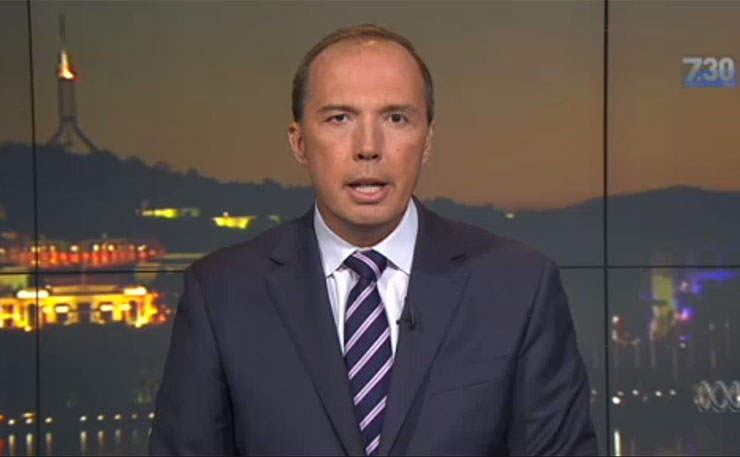Australia now has a bureaucracy specifically engineered to deliver indifference and inflict suffering, writes Professor Stuart Rees.
Sociologist Max Weber warned that if bureaucracies – like Australia’s Department of Home Affairs for example – were left unchallenged, they would threaten individual freedom. Conformity would be demanded, punishment dished out for non-compliance and people would end up in an ‘iron cage.’
The Czech novelist Franz Kafka described nightmares resulting from cruel bureaucracies because avenues of appeal, let alone efforts to gain an audience with bureaucratic chiefs, would be blocked. He described unaccountable procedures, inaccessible documents and encounters with faceless, humourless officials.
Running government departments by fear may seem as preposterous as the notion that an Australian cricket team would plan to cheat in a Test match. But fear engendered by cruelties has become central to the operations of an allegedly rational, efficient Australian government. It’s not that unusual.
Each day, huge numbers of families bargain at the interface between themselves and a bureaucracy, perhaps a Traffic Department, Centrelink, a Housing Department, Home Affairs, Health Insurance Companies or the National Disability Insurance Scheme (NDIS). Regarding the latter, 55 year-old Hamish, who is blind, has explained, “Over the last nine months, I have phoned NDIS every other week and left my requests. They never responded to my calls. Eventually I called my MP. When she intervened, NDIS replied.”
Thousands of individuals on bridging visas or temporary protection visas wandering around major Australian cities will have no influential MP who might intervene on their behalf. Applicants for citizenship may also feel powerless. They are all up against the Turnbull/Dutton engineered Home Affairs Department which is fulfilling Weber and Kafka’s predictions. An iron cage has been crafted, endless nightmares guaranteed.
Cultivating Fear
Being frightened to complain enables government by bureaucracies to proceed unhindered. In office buildings in Canberra, demoralized public servants pore over papers, fail to clear their in-trays and play with people’s lives. Minister Peter Dutton and the public servant chief of Home Affairs seem proud of their reputation for being bullies. The bureaucracies they preside over are distant, invisible, inaccessible and largely unaccountable.
To the people whose lives are affected by getting nowhere with bureaucracies, it is no consolation that the staff may be almost as fearful as the applicants whose claims they sift and judge. If your boss is a bully, you may decide that it’s best to keep your head down, keep the process going, do as little as possible for the vulnerable and as much as possible not to disturb the system.

Excessive delays in responding to citizenship applications illustrate Weber’s warnings. To powerless applicants, non-responses feel like indifference, a maladministration thriving on fear. There’s another explanation: office in-trays not being emptied because the government has outsourced services or has limited funding to recruit staff, train and support them.
A senior Federal politician has told me, “Some of these problems may not be the fault of existing staff. In an under-funded, under-staffed outfit like Home Affairs where many of the experienced Immigration personnel have left, morale is at rock bottom.”
Discrimination, Maladministration
In the conduct of government administration, it may be naive to assume that a scrupulously fair, due process occurs. During 2013, former Minister for Immigration Scott Morrison directed ASIO to delay security clearances for refugees. ‘No’ to due process. ‘Yes’ to discrimination and to punishment of certain groups.
An official alarm bell rang when the Federal Ombudsman reported in December 2017 that on issues such as the handling of citizenship applications that required integrity and identity clearance, some people had waited over 18 months for an outcome. The report also noted an increase in the number of applications where a decision had not been made for over two years.
The following case refers to an application which has stayed unresolved for three years. Given the fear that people experience, the names and some details have been changed.
On their daughter’s birth in Brisbane, stateless parents applied to register their daughter as an Australian citizen. But ‘Immigration’ – now Home Affairs – seems to have been determined to delay or resist claims from people who might not look like white South African farmers.
The dehumanizing journey of father Matt began with an assurance from a government department that the application concerning his little daughter would take no more than 80 days. At that rate the issue should have been settled by September 2015.
Frustrating years for Matt and his wife waiting to have their application answered have also involved a middleman, an Immigration Agent, who could be helpful, or might be part of the delay. Letters to and from the relevant government department are funnelled through such agents and only reach applicants indirectly.
Between September 2015 and April 2018, Matt received four dismissive letters from the government department, each saying that the matter is complex, even though the law on such matters is crystal clear. The letters included references to complexity and security and were signed by the first names of different public servants: William one day, Amanda the next.

Immigration agents may appear indispensable but can be part of the maladministration. They take information from applicants, dress it up in their own legalistic jargon, put it on headed notepaper, post the information to the government department and charge their clients large fees. Matt estimates that the fruitless application process has cost him over $10,000. In the last exchange, his Immigration agent charged $600 to post the documents which the family had assembled. A dismayed and almost beaten Matt says, “It’s a brutal process”.
Matt has also explained, “If we ever protested to the department, that could affect our applications. The best to happen would be being pushed to the back of a queue, the worst to have our application turned down. There’s nothing we can do.”
At least Matt, his wife and daughter are not imprisoned on Manus or Nauru. An editorial in The Saturday Paper of March 24 listed the names of seven people who had died in detention while Minister Dutton was responsible for their care. The file of Fazel Chegeni ran to 700 pages. The paper shuffling must have been tiring. Eyes diverted from a touch of humanity must have begun to ache.
ABC’s Four Corners could investigate the extent to which politicians and their public servants are governing by fear. Alternatively, a Royal Commission should be asked to examine the interface between powerless people and a Home Affairs bureaucracy whose Minister seems unmoved by the nightmares he inflicts on his clients. Because freedoms and even lives have been lost within his department’s iron cage.
Donate To New Matilda
New Matilda is a small, independent media outlet. We survive through reader contributions, and never losing a lawsuit. If you got something from this article, giving something back helps us to continue speaking truth to power. Every little bit counts.





